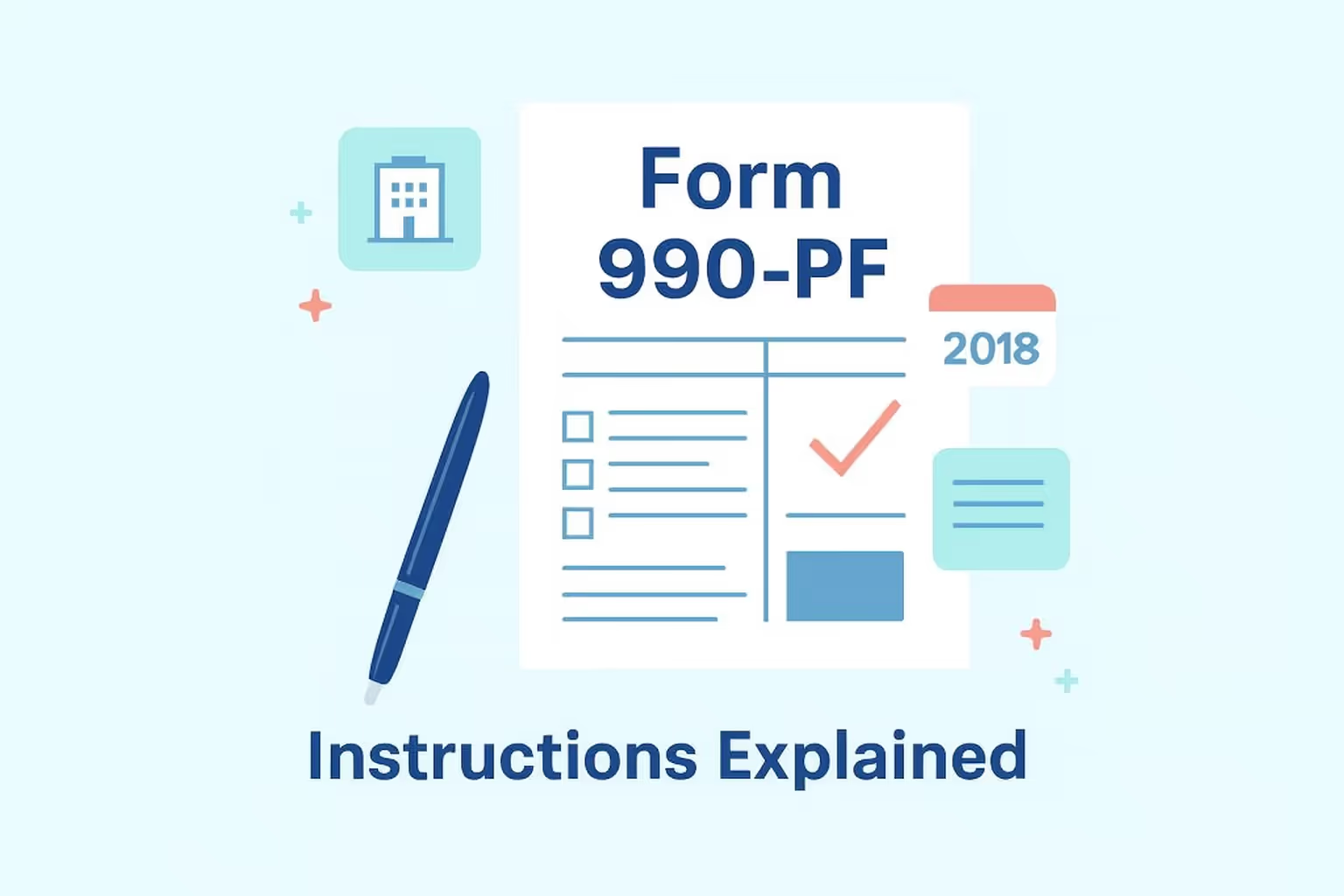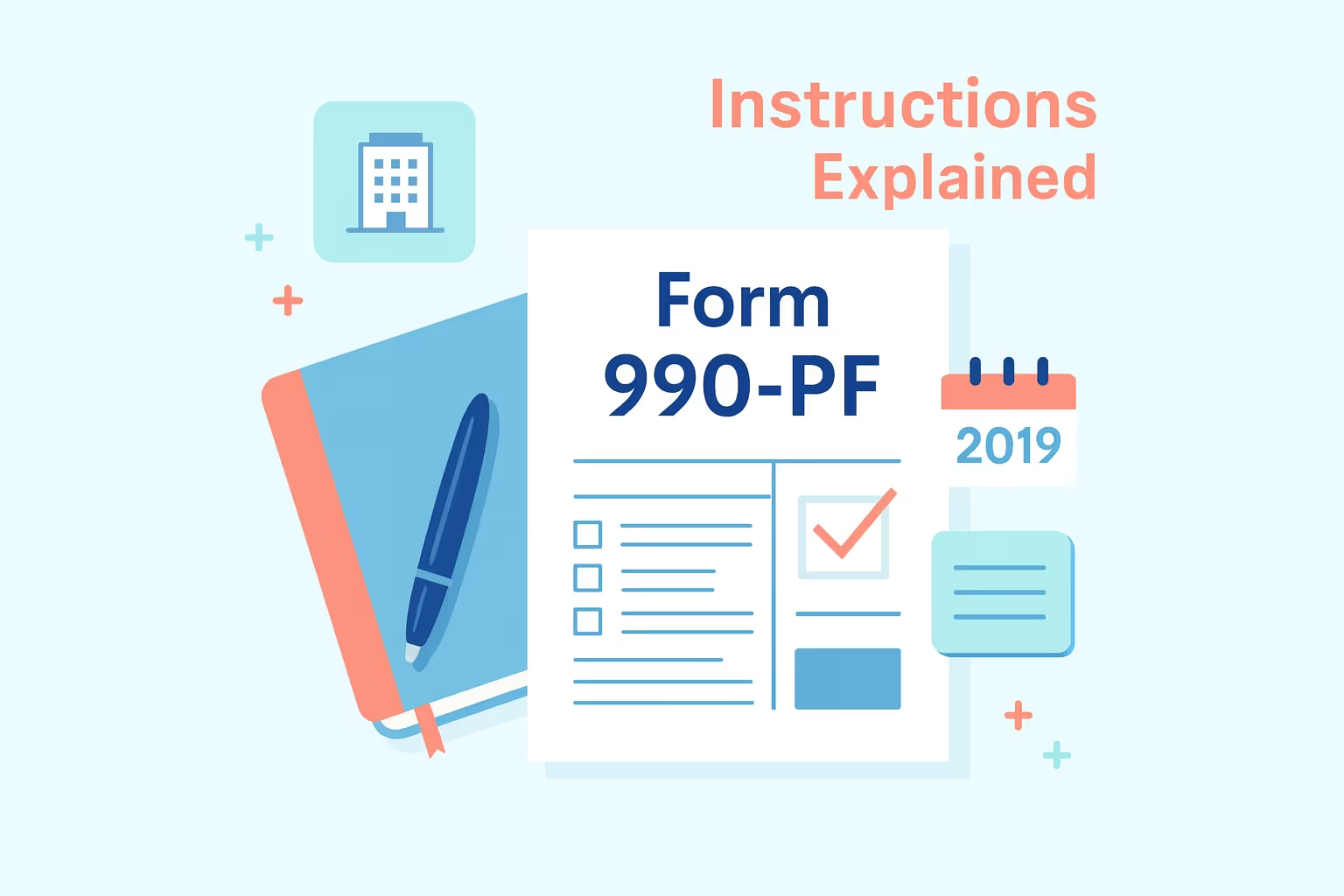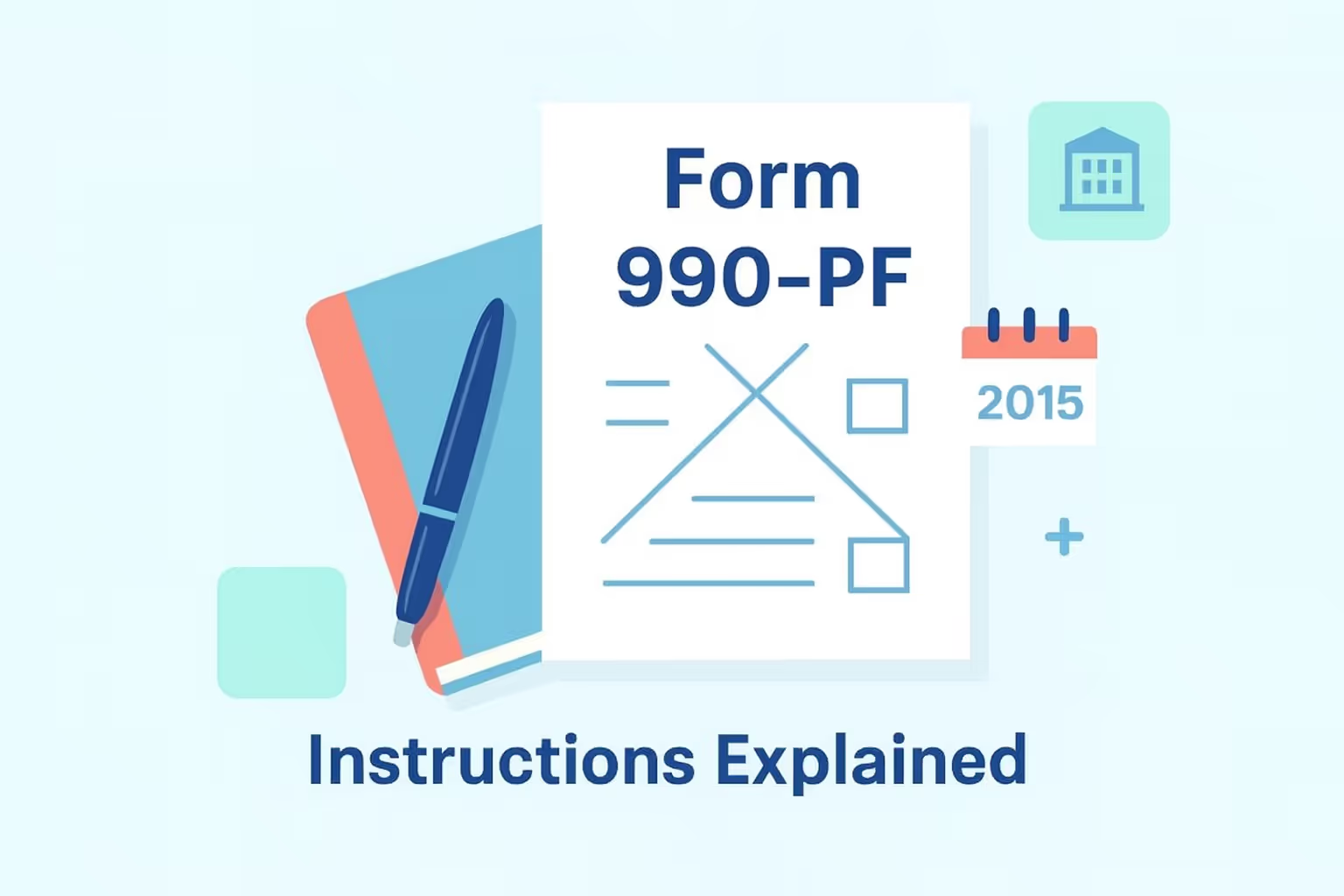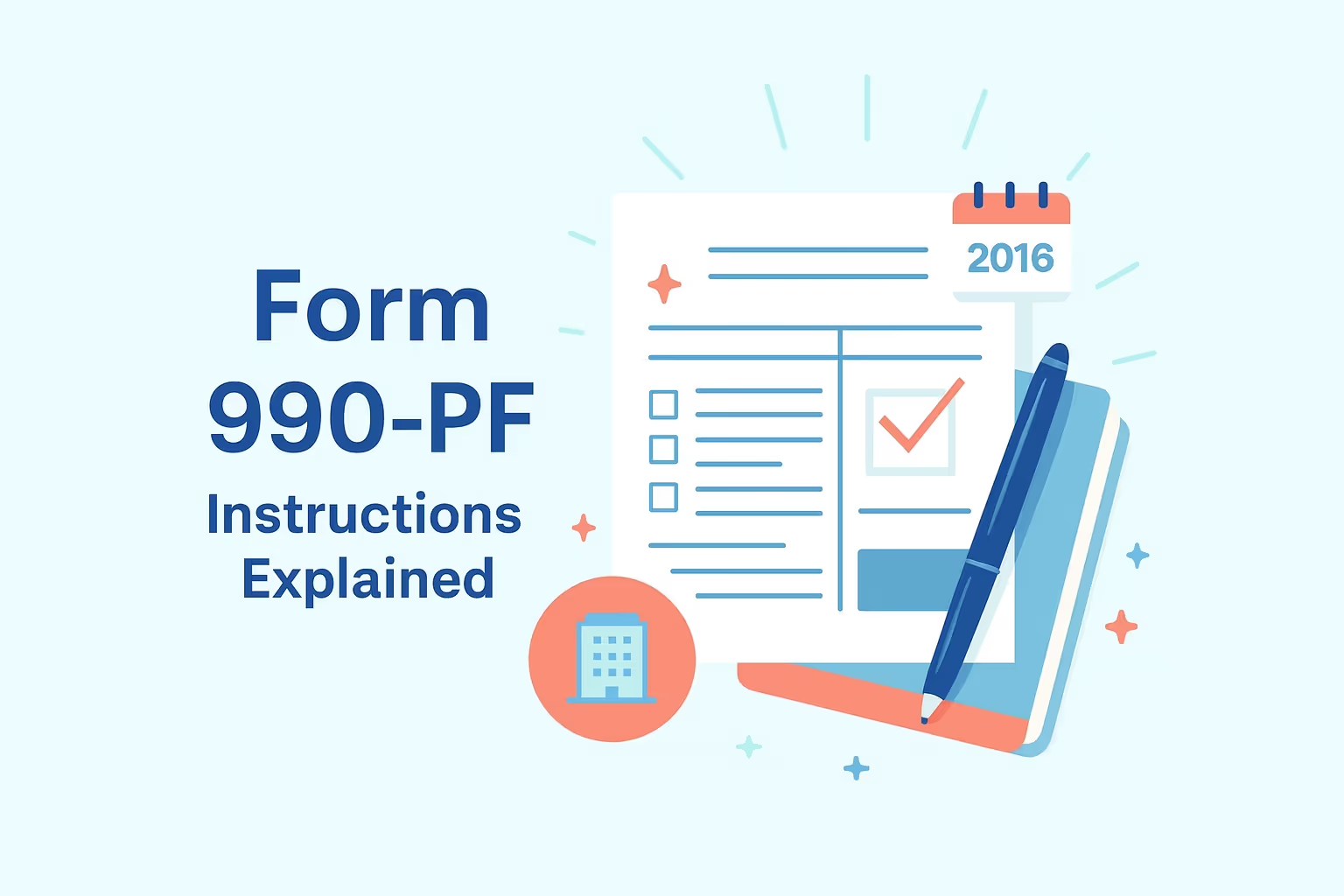
What IRS Form 990-PF (2019) Is For
Form 990-PF for the 2019 tax year reports a private foundation’s net investment income, charitable distributions, excise tax, and overall financial activity. It applies to taxable private foundations, exempt private foundations, and any nonexempt charitable trust treated as a private foundation. The Internal Revenue Service requires this form every year, regardless of adjusted gross income, investment income, or fund balance. It ensures reporting accuracy for capital gains, net assets, and foundation managers responsible for compliance.
When You’d Use Form 990-PF (2019)
A filer uses the 2019 version when reporting financial accounts, investment income, and program-related investments for a foundation's tax year beginning in 2019. Missing a due date or failing to pay income taxes can result in a late filing. An amended filing is required when errors are identified in excise tax-based calculations, charitable distributions, unrelated business income, or adjusted net income. It also applies if the filer must correct items affecting tax-exempt status or private foundation status.
Key Rules or Details for 2019
- Excise tax structure: The 2019 return uses a 2 percent or 1 percent excise tax on certain net investment income. Filers must calculate liability correctly to avoid additional income tax assessments.
- Minimum payout standard: Foundations must distribute qualifying distributions that meet the minimum investment return test. Failure to meet this requirement may create undistributed income subject to penalty.
- Foreign Reporting Rules: A foreign foundation operating in a foreign country is required to accurately report its income. Filers must also include details on foreign bank accounts and program-related investments.
- Schedule documentation: The form requires the reporting of capital gains, net income, and interest income. Filers must also attach schedules relating to fund balances, balance sheets, and related expenses.
- Prohibited transactions: Foundations must avoid prohibited tax shelter transactions and certain personal benefit contracts. These actions may affect excise tax liability and exempt status.
Browse more tax form instructions and filing guides in our Forms Hub.
Step-by-Step (High Level)
Step 1: Gather financial and activity records
Collect data relating to investment income, capital gains, mutual funds, interest income, mortgage interest, and fund balances. Include documents covering financial accounts, excess business holdings, charitable contributions, and any activity that might affect net income or excise tax.
Step 2: Use the correct 2019 Form 990-PF
Download and complete the exact 2019 version, as excise tax-based rules differ from those in later years. Using the incorrect form may result in errors in reporting income tax, qualifying distributions, or net investment income tax calculations.
Step 3: Calculate investment income and excise tax
Determine net investment income by including dividends, interest income, capital gains, and tax-exempt interest. Apply the proper excise tax rate by reviewing qualifying distributions and ensuring the calculation aligns with statutory threshold amounts for the foundation’s gross receipts.
Step 4: Verify distribution requirements
Confirm that charitable distributions meet the minimum investment return requirement. This section includes checking direct philanthropic activities, program-related investments, and any distributions supporting charitable purposes to prevent assessments for undistributed income.
Step 5: Attach schedules and statements
Add schedules for reporting fund balances, balance sheets, related expenses, adjusted gross income items, and any foreign country disclosures. Include statements explaining prohibited tax shelter transactions, personal benefit contracts, or excess parachute payment issues when applicable.
Step 6: File the return and pay amounts owed
Submit the form electronically or by mail in accordance with the Internal Revenue Service's procedures. Pay income taxes, excise tax, and estimated tax obligations to prevent situations where tax remains unpaid and penalties increase over time.
Learn more about federal tax filing through our IRS Form Help Center.
Common Mistakes and How to Avoid Them
- Incorrect excise tax rate: Filers sometimes apply later rules instead of the correct two-tier system, and they should confirm the 2019 rate carefully to avoid tax liability errors.
- Distribution miscalculations: Some foundations misjudge the minimum investment return, and they should recalculate asset values precisely to prevent undistributed income penalties.
- Foreign reporting gaps: Filers may omit foreign bank data; therefore, they should carefully review all financial accounts to ensure they meet all reporting obligations.
- Missing prohibited transaction disclosures: Some organizations overlook prohibited tax shelter transaction details and should confirm that no disallowed transactions occurred to maintain their exempt status.
- Ignoring estimated tax duties: Certain foundations skip required estimated tax payments, and they should compare prior-year income taxes to ensure timely payment and prevent additional penalties.
Learn more about how to avoid business tax problems in our guide on How to File and Avoid Penalties.
What Happens After You File
The Internal Revenue Service reviews the return for accuracy and may request clarification regarding program-related investments, qualifying distributions, or financial accounts. Notices may appear when unpaid tax exists or when discrepancies affect federal income tax or excise tax calculations. Filers may seek penalty relief, request adjustments through a tax professional, or correct items related to non-charitable exempt organizations or private operating foundations. Processing may take several weeks, depending on whether the return is late or amended.
FAQs
How do private foundations handle estimated tax for a 2019 filing?
Foundations must make estimated tax payments when investment income or excise tax liability exceeds the statutory threshold amounts. Missing these payments may result in penalties based on unpaid tax and overall financial activity.
How do net assets appear on the balance sheets required for Form 990-PF?
The form requires detailed balance sheets listing net assets, financial accounts, fund balances, and related expenses. Foundations must accurately report income and explain any changes related to program-related investments or charitable purposes.
How is excise tax-based reporting handled for a private foundation or section 4947(a)(1) trust?
Both a private foundation and a section 4947(a)(1) nonexempt charitable trust treated as a foundation must calculate excise tax based on net investment income. The Internal Revenue Service requires consistent reporting to verify compliance.
How does undistributed income apply under tax-based rules for 2019?
Undistributed income occurs when qualifying distributions fail to meet the minimum investment return. The Internal Revenue Service may assess additional excise tax until the foundation resolves the shortfall.
How do rules for minimum investment returns apply to private operating foundations?
Private operating foundations must meet the minimum investment return standard just like other private foundations. They must verify charitable distributions and ensure that the calculation accurately reflects the fund balances and asset values.
How do exempt status considerations apply when foundation managers review Form 990-PF?
Foundation managers must verify that activities align with the requirements for exempt status. This includes reviewing charitable purposes, avoiding prohibited transactions, and ensuring reporting accuracy across financial accounts.
How do tax-based disclosures apply to net income from mutual funds or foreign foundation assets?
Tax-based disclosures require reporting net income from mutual funds, foreign foundation assets, and foreign bank accounts. The Internal Revenue Service uses these details to review compliance with income tax and excise tax rules.
For more resources on filing or understanding prior-year IRS forms, visit our guide on Nonprofit & Exempt Organization Forms.




























